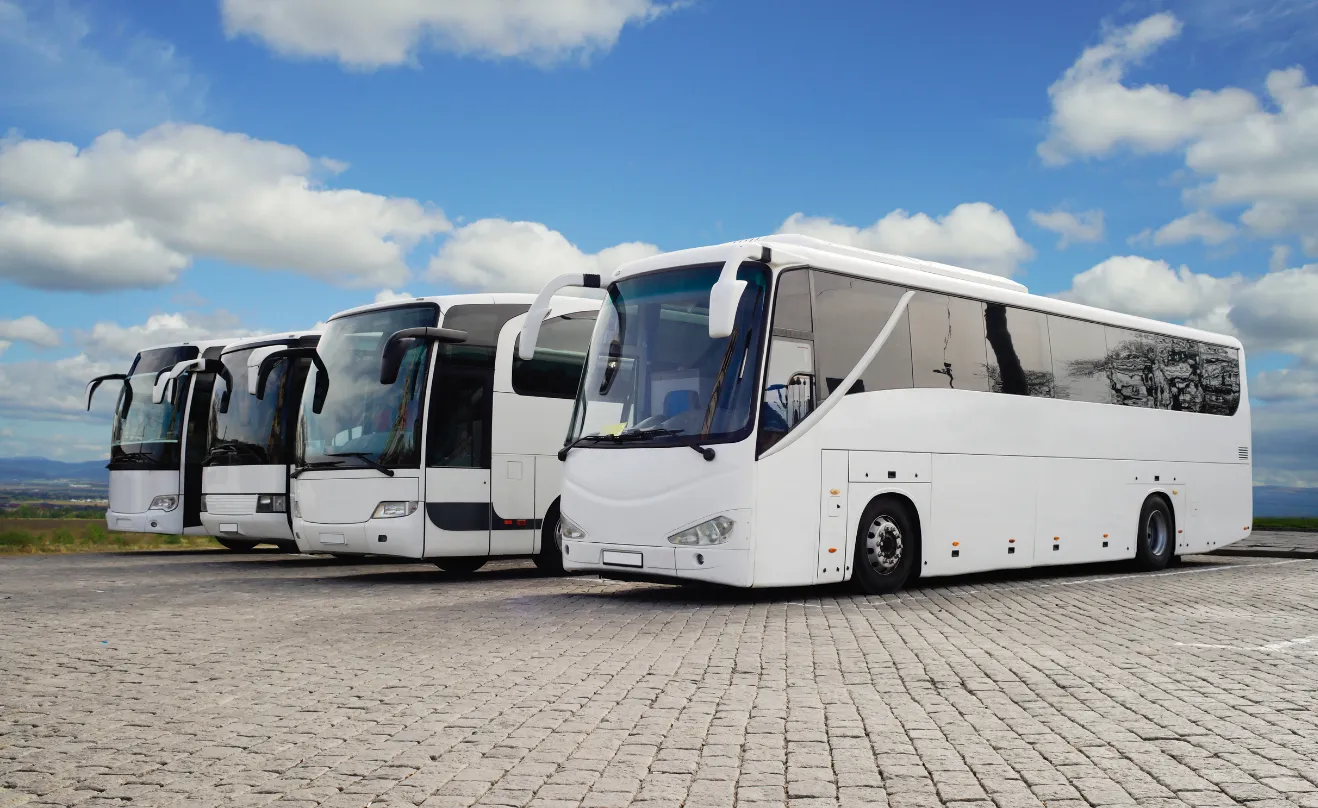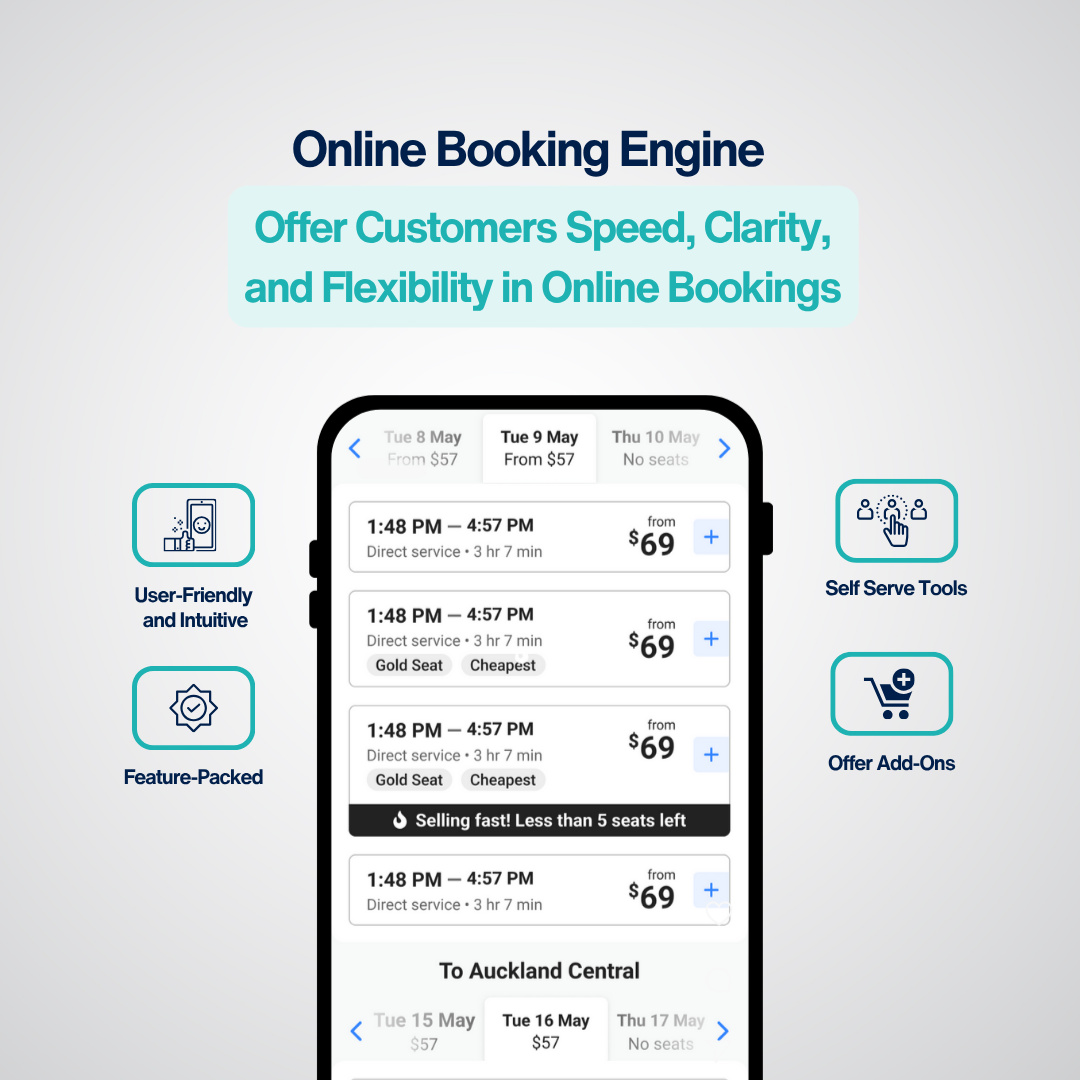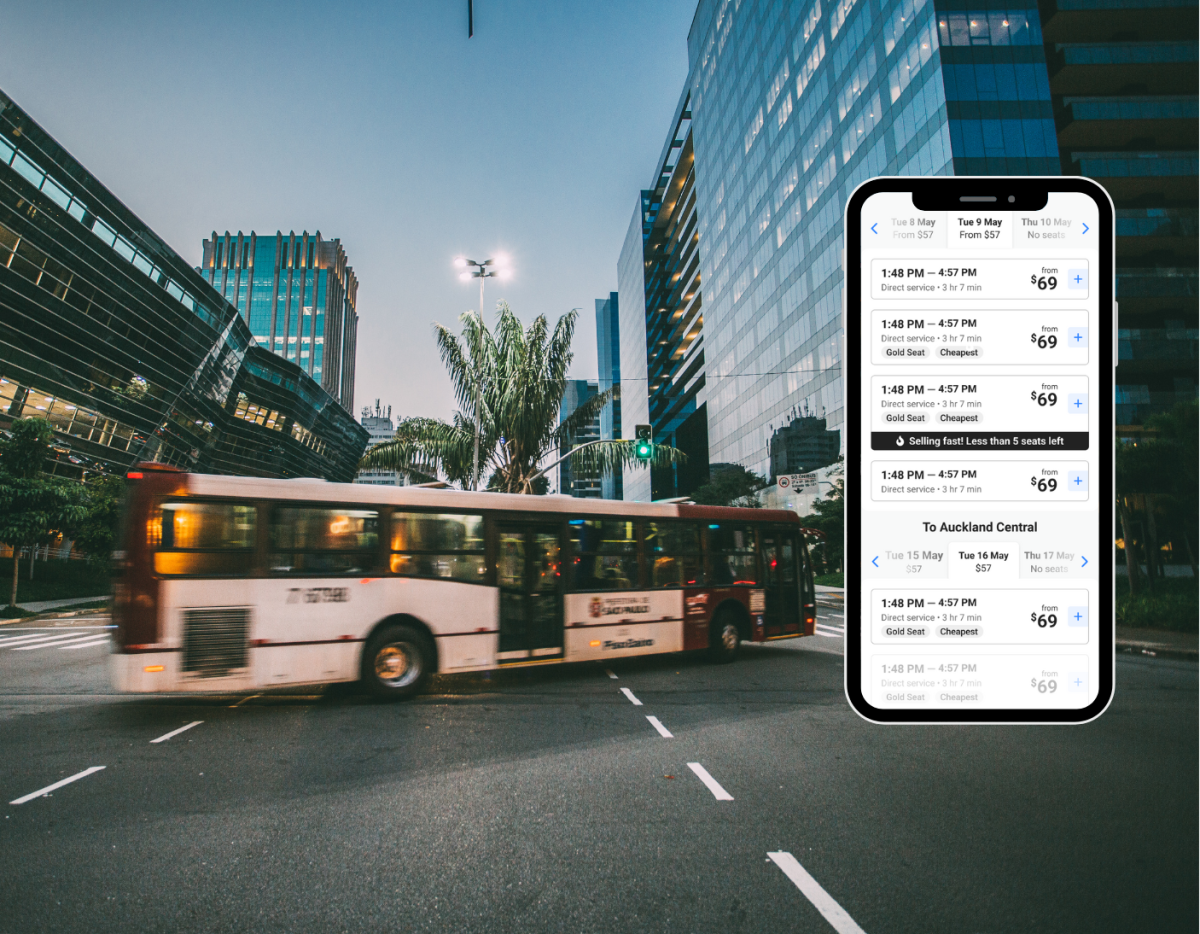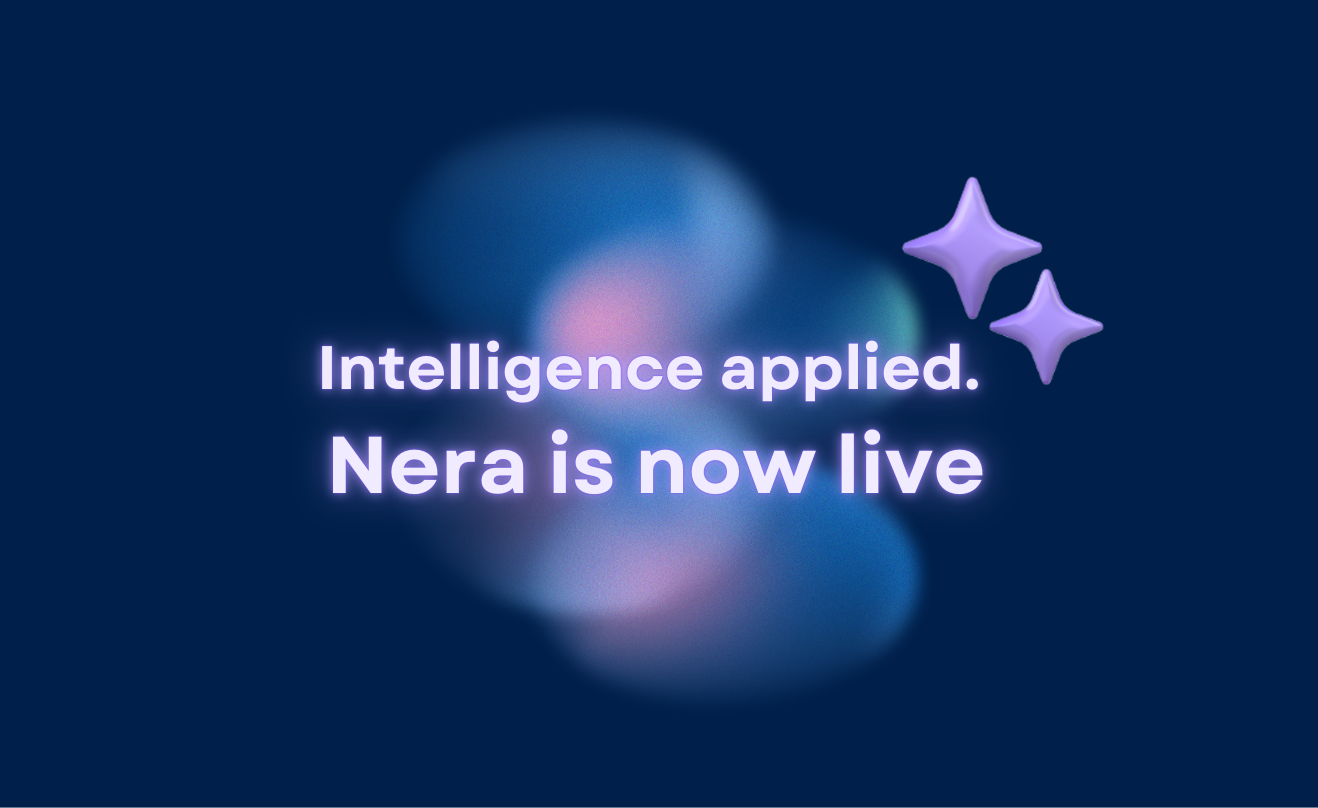How Bus Travel and Ticketing Services Are Going Digital: A Look at the Modern Passenger Journey

How Bus Travel and Ticketing Services Are Going Digital: A Look at the Modern Passenger Journey
The last few years have seen a revolution in bus travel and ticketing services. Where passengers once waited in long lines at crowded terminals, digital platforms now let travelers browse routes, compare schedules and prices, and buy tickets entirely online or on their phones. In North America and around the world, this shift is making travel planning easier, more efficient, and more reliable. A modern bus passenger can research trips in advance, pick seats, pay securely by credit card or mobile wallet, and get an electronic ticket delivered by email or text, all from the comfort of home or even while on the go.
Zaui, a transport booking software built on decades of travel-industry experience, helps bus, shuttle and charter companies join this digital transformation. Zaui’s platform supports everything from transportation booking engines and mobile apps to route planning and digital ticketing. By adopting tools like real-time distribution, mobile ticket scanners, and automated communications, bus operators can give customers a fast, friendly experience while simplifying their own operations.
In this article we’ll walk through the modern passenger journey step by step from searching and booking a trip, to checking in, to riding in comfort and highlight how technology, especially Zaui makes each stage smoother. We’ll cover topics like online seat selection, mobile apps, connections and interlining, and even amenities like Wi-Fi and refreshments that passengers expect today. Along the way we’ll spotlight Zaui’s features (mobile check-in, route planners, dynamic pricing, and more) that help bus and charter operators compete in the digital age. For concreteness we’ll use examples from Chicago and Illinois, where buses serve conventions at McCormick Place, tourists in Lincoln Park, suburban commuters in Naperville and Schaumburg, and groups of students and sports teams all traversing the city and beyond.
Planning and Booking Online

Today’s bus travellers start their journeys on a screen. Rather than hustling to a ticket booth, many passengers first search online for routes and schedules. They might go to a carrier’s website or mobile app, or use a travel platform (an “OTA”) that aggregates many operators. These booking sites provide real-time availability: travellers can choose their departure city and destination, see upcoming departure times, compare prices, and even view a seating map. Crucially, modern platforms show all this information transparently so customers know exactly what to expect. As a result, digital ticketing “has revolutionized the way people travel, eliminating long queues and uncertainties while offering seamless booking experiences”
For bus operators, building a strong digital presence is now essential. Zaui’s web checkout and booking engine is designed to be user-friendly and mobile-first. It lets a passenger book with just a few taps, selecting pickup and drop-off stops, viewing the fare, and completing payment in a single streamlined flow. In practice, this means riders can easily buy tickets from a smartphone or laptop. For example, a Chicago visitor planning a trip to Naperville for the day can open Zaui’s booking page, pick a departure from downtown at 10:00 AM, see the $15 fare, and secure a seat in minutes. Zaui’s checkout is mobile-first, so the process looks and works the same on phones and desktops.
Zaui also supports self-service features that empower travellers (and reduce operator workload). Passengers can create profiles, manage multiple trips, and even modify bookings themselves through an online portal. Zaui’s platform offers guest tools for cancellations, refunds, and itinerary changes, so customers can update details without calling an agent. This is much more convenient for passengers and cuts down busywork for the company. For example, if a sports team needs to change a charter bus return time, the captain can log in, reschedule the trip and get a new ticket instantly all in English (the system supports multiple languages, though American English is common for U.S. users).
On the operator side, Zaui’s inventory control and integrated scheduling engine ensure that online bookings don’t oversell the bus. The software centralizes all tickets, seats, and vehicles in one place. If seats sell out fast, the system updates immediately across the website and distribution channels so passengers never buy a ticket that doesn’t exist. In short, the modern booking process is about speed and transparency and Zaui’s toolkit helps make that a reality.
Ticketing and Check-In: Fast, Contactless Boarding

Once a passenger buys a bus ticket online, the experience shifts to check-in and boarding. In today’s digital journey, the traditional paper ticket is mostly gone. Passengers typically receive an e-ticket via email or text message, often with a QR code or barcode. When it’s time to board, they simply show their code on a smartphone screen (or a printed ticket if needed) to a scanner or the driver. This contactless process is fast and easy, reducing lines and stress at departure.
For example, imagine a group of 50 students using a Chicago charter bus rental for a field trip. Each student or chaperone has a mobile ticket on their phone. As they arrive at the bus, the driver or staff member uses the Zaui mobile app or a portable scanner to scan each QR code in seconds. The check-in is over in minutes, whereas in the old days it might have involved stapling paper tickets or manually verifying lists. Zaui’s fast ticketing capability “make bookings on the fly, scan tickets and check-in passengers with integrated mobile and hardware solutions” creates a seamless experience.
Passengers scanning mobile tickets at boarding exemplify the new normal. Modern bus software, like Zaui’s, supports QR code scanning and electronic ticket validation at the gate. Zaui’s mobile app (available for iOS and Android) turns any smartphone or tablet into a mini ticket terminal. Drivers or check-in staff can open the app to see the manifest of riders and simply scan e-tickets or QR codes to mark people as boarded. This eliminates manual data entry and long queues. The app lets operators “accept bookings and process payments” on the spot, and “access your business info and preview… guest booking info from one view,” checking people in with a click or scan.
The Zaui mobile app also facilitates walk-up sales at terminals or popular stops. If someone shows up an hour before departure without a reservation, staff can use Zaui on their phone or tablet to sell a last-minute ticket right then and there. The ticket is immediately issued and sent to the passenger’s device, or printed via a portable printer. This mix of offline and online sales channels, all managed in one system is a key part of the digital strategy. Operators stay agile: whether a booking was made online days in advance or on the spot by phone or in person, everyone’s in the same software with real-time updates.
Behind the scenes, Zaui keeps meticulous track of issued tickets. The system can upload third-party barcodes (for example, codes from partner agencies) and still recognize and scan them at check-in. It then updates passenger manifests instantly. If there’s a third-party ticketing partner involved (like a travel agent or another tour company sharing the bus), Zaui can reconcile those sales and allow the driver to scan all tickets seamlessly. This unified check-in under one interface reduces confusion.
Overall, digital ticketing saves time and errors. Passengers don’t have to worry about losing tiny scraps of paper, everything’s on their phone (or the operator’s tablet). As one industry analyst notes, advanced ticketing systems “provide clear and upfront fare information” and enable passengers to receive instant booking confirmations via email or SMS. Zaui builds on that by adding tools like pre-trip SMS reminder integrations and post-trip feedback emails, further enhancing the passenger experience.
Operations Behind the Scenes: Routes, Hubs, and Interlining
While passengers enjoy the convenience of digital tickets, operators benefit from powerful planning tools. Modern bus scheduling can be complex, companies might run dozens of routes each day, some with multiple legs and stops. Zaui provides a Route Planner that simplifies this. Operators can create multi-stop routes, set pickup and drop-off points, and even build interconnected services
One key innovation is hub-and-spoke planning. In a large city like Chicago, it’s common to use hubs (major transfer points) to link journeys. For example, Chicago might serve as a hub connecting buses coming from Naperville, Schaumburg, and other suburbs. Zaui’s “Connections” feature explicitly supports this concept: by defining hubs and creating connected routes, operators can offer more travel options without making customers rebook separate tickets. In practice, this means a passenger could book a trip from Naperville to Schaumburg with a short transfer at Chicago Union Station, all in one go.
This approach is similar to interlining in transit: it lets one bus continue on another route without the passenger changing vehicles. For instance, a Chicago tour bus might arrive at McCormick Place as one route and, after a quick layover, depart on a different route toward a suburban hotel. Interlining reduces transfers and idle time for both buses and travelers. It’s especially convenient for groups traveling through a hub city. By “interlining these two routes, the passengers could stay on the bus” instead of having to get off and wait for another bus.
Zaui makes planning such connections easy. Its Route Planner lets operators map out multi-leg trips and automatically schedule them with appropriate layover times. All legs of the journey appear in one itinerary during booking, so passengers see their whole trip upfront. The software then auto-manages seat inventory and timing across the connected segments. In sum, these hub-and-spoke features and interlining support mean more convenience for passengers (fewer manual transfers) and more efficient fleet use for operators.
In addition to advanced routing, Zaui handles daily scheduling automatically. You can set up recurring timetables and even duplicate entire trip patterns for future dates. This saves staff hours of manual work each week. When buses change drivers or break down, Zaui can reassign resources on the fly with its Resource Scheduler, ensuring each departure always has a professional driver and vehicle read. And drivers themselves have access: Zaui supports driver-specific logins, so chauffeurs can log into the mobile app or a web portal to view their schedules and passenger manifest. This keeps the human element, the skill and care of a professional driver fully integrated into the digital workflow.
Pricing, Fares and Passes
Pricing strategy has also been transformed by technology. Instead of fixed fares, digital systems allow dynamic and distance-based pricing. For example, Zaui’s platform supports Distance Based Pricing, letting operators charge by the mile in addition to flat rate. This means fares can scale with longer routes, which is both fair for passengers and transparent. A passenger riding from downtown Chicago to faraway Schaumburg might pay a bit more than someone traveling a shorter hop.
On top of that, Dynamic Pricing is increasingly common: software can automatically adjust fares based on demand, time of day, or day of week. During rush hour or big event days (say, a Bears game or a convention at McCormick Place), prices could go up slightly to reflect high demand, and drop during off-peak periods. The goal isn’t to overcharge, but to encourage use of under-filled trips and balance loads across the schedule. As Zaui points out, operators have seen revenue rise by 20% with smart dynamic pricing, essentially by better matching supply to demand.
Additionally, Zaui lets operators sell passes for frequent riders. Its Passes feature can create day-passes or trip-passes linked to guest accounts. For instance, a visitor staying in an Illinois hotel for a convention might buy a 3-day pass that covers unlimited rides between their hotel, the convention center, and local attractions. The pass is digital, it links to the profile in Zaui’s system and automatically validates the holder on multiple trips. This all happens online, saving the need to punch a paper pass or issue multiple tickets.
When collecting fares, electronic payments have become the norm. Zaui integrates with 17+ payment gateways so customers can pay with credit cards, mobile wallets (Google Pay, Apple Pay) or even link to loyalty points. According to industry reports, these contactless payments greatly improve convenience. For passengers, it means not having to carry exact change or fill out forms; for operators, it means less handling of cash and faster boarding. Some airlines and buses are even experimenting with blockchain-backed tickets to eliminate fraud. Zaui’s system is ready for such future tech, offering secure digital ticket records to prevent duplication and ensure trust.
Overall, digital pricing and payment systems give both riders and operators flexibility. Passengers appreciate knowing the cost upfront and having multiple payment options. Operators benefit from better yield management. And Zaui provides the analytics behind it: its Custom Reporting lets companies see sales trends, seat loads, and revenue breakdowns, guiding smarter pricing decisions.
Onboard Comfort and Connectivity

The modern digital journey isn’t just about apps and tickets, passengers expect comfort and connectivity on board too. Most coach buses and minibuses deployed for charter or intercity service today come equipped with amenities that rival a first-class cabin. Imagine a sports team boarding a charter bus to take the hour-long ride to a college game. They settle into wide reclining seats with seatbelts and fold-out tables, plug phones and laptops into USB chargers or 110V outlets, and maybe stream music or movies on overhead monitors. In many premium shuttles, wireless Wi-Fi is standard, so passengers can stay productive or entertained. Wi-Fi also lets operators push live updates or promotions during the trip.
Refreshments are another way to add value. Some high-end charters even have attendants serving hot coffee, bottled water or snacks much like airline service. Even on standard buses, drivers often stop at rest breaks where passengers can grab drinks. These creature comforts (clean restrooms, climate control, personal reading lights) help passengers take the edge off long trips. In Chicago for instance, many tourists and groups expect at least free Wi-Fi on tours or shuttles to destinations like Lincoln Park, Navy Pier or downtown hotels. Zaui’s role here is behind the scenes: comfortable buses and amenities lead to better reviews and repeat bookings. Zaui’s system can note which amenities each vehicle has (e.g. “TV, Wi-Fi, restroom”) so that when a tourist books a group trip, they know exactly what their coach offers. This visibility helps ensure convenience and comfort, two words passengers love to see.
Digital Distribution and Partnerships
Getting tickets is one thing; selling tickets is another. Digital bus platforms open up distribution channels far beyond the walk-up booth. In the past, a Chicago charter company might rely on phone inquiries or local travel agents. Today, Zaui connects operators to global marketplaces through its Channel Manager. For example, Zaui offers a real-time integration with Busbud, a worldwide bus OTA that covers 3,900 companies and 16,000 cities. By flipping a switch in Zaui, a local Illinois shuttle service can automatically list routes on Busbud’s site. Travelers around the world searching for transportation from Chicago to Milwaukee or Niagara Falls might see and buy these tickets.
Zaui supports similar partnerships with Distribusion, GotoBus, Wanderu, and other booking platforms. These integrations are plug-and-play: inventory and prices sync automatically, so Zaui operators don’t have to duplicate work on multiple sites. When a foreign tourist books through Busbud, the reservation flows right into Zaui’s system and appears on the bus manifest. This global reach is a boon for charter bus rentals. For instance, an event at McCormick Place might draw visitors from across the U.S.; those groups could book local shuttles via an online portal instead of calling. Zaui’s distribution feature “makes it easy to sell through multiple channels and expand an operator’s reach.
On a smaller scale, Zaui can connect with local hotel concierges or DMO websites. A hotel in Schaumburg could use Zaui’s booking widget to sell airport shuttles or city tours directly to guests. Zaui also integrates with point-of-sale (POS) hardware: at Chicago hotels or event lobbies, staff can swipe credit cards on Zaui’s mobile app and issue bus tickets instantly. The underlying theme is omnichannel convenience: whether a customer finds your bus online, by phone, via a reseller, or even in person, Zaui handles the transaction seamlessly.
Events, Tours, and Group Travel
Let’s zoom in on some typical events and group uses for buses, especially around Chicago. The city’s lakefront and downtown areas host a vibrant mix of conventions, sporting events, and tourism. For example, McCormick Place (in Chicago’s South Loop) is one of North America’s largest convention centers. Large conventions require massive ground transportation: shuttle buses from O’Hare or Midway airports, charter buses for off-site meetings, and point-to-point services for attendees. Digital booking makes managing these complex shuttle networks feasible. Organizers can publish shuttles on their event website using the Zaui system, and attendees can book online for the times and routes they need. Zaui’s group booking features (pass codes, bulk reservations, invoice billing) help corporate clients reserve multiple seats quickly.
Sports teams are another big market. In Illinois, college teams and even high school teams frequently rent buses for away games. A coach might log into Zaui, choose a bus and driver, and book a round-trip to a Saturday game, all in under 10 minutes. If a last-minute away game pops up, booking by the hour is even possible with Zaui’s system, operators can enable on-demand minibus or charter bookings by the hour if they have idle vehicles. Even fan groups use charter services: a block of tickets can be sold through Zaui’s walk-up sales at a stadium box office, for example, to send cheering sections to an away game. And because every ticket is tied to a seat, groups never exceed bus capacity.
Tourists and visitors are also a natural fit for buses in Chicago. City tours, sightseeing shuttles, and hop-on/hop-off buses have all gone digital. When a family of tourists books a bus tour through an app, they appreciate features like getting SMS reminders before departure and seeing an e-ticket QR code that allows them to hop on quickly. Zaui can manage these tours too, bundling multiple attractions or pickup points into one package. Students on field trips are another example: imagine a school group needing transportation to Lincoln Park Zoo or the Adler Planetarium. A teacher could use Zaui to coordinate multiple minibuses, assign students to specific seats, and even issue permissions or waivers through the platform.
Throughout all these scenarios, service is key. Zaui’s platform emphasizes a smooth customer experience. Automated pre-trip notifications can be sent by email or text (for instance, “Your bus to Schaumburg departs in 1 hour from Michigan & Wacker”. If delays occur, say a traffic jam on Lake Shore Drive, the Zaui Service Disruption Manager lets operators alert affected passengers in real time. Passengers then feel cared-for, instead of stuck in uncertainty.
Chicago, Illinois: A Digital Transit Example
Chicago itself is a great microcosm of these trends. The city’s public transit agency (CTA) has offered mobile ticketing for buses and trains for years, and private shuttle companies are following suit. For instance, an airport shuttle company in Lincoln Park can let riders pay via a mobile app when they board. A charter bus rental company in Naperville might use Zaui to manage bookings and communicate in English to local customers. Zaui’s system is fully localized to the United States market, including support for state-specific needs (like Illinois sales tax on tickets).
Comfortable buses, too, are now expected in Illinois. Greyhound buses in Chicago famously offer free Wi-Fi, power outlets, and generous legroom. Many private coaches match or exceed these comforts. The user experience (UX) of bus travel in Chicago has become as much about in-ride amenities as about price. When bus passengers enjoy free drinks (say bottled water or coffee) or entertainment screens on long trips, they associate ground travel with quality. Zaui can flag which buses offer Wi-Fi or refreshments, and that information shows up during booking, helping travelers choose wisely.
Events at McCormick Place underscore Zaui’s value. Large conferences often book hundreds of hotel room blocks, and many of those include off-site transport. Zaui’s tour packaging can bundle a convention registration with shuttle tickets, or include transit in a packaged itinerary. For example, a big trade show might sell a convention pass plus shuttle ticket, with Zaui handling the seat reservations. In a city with major sports teams (Cubs, Bears, etc.), charter buses also shuttle fans to games. Digital ticketing means a baseball fan only needs to tap a button on his phone to reserve a spot on a fan bus to Wrigleyville, without any phone calls or pay-in-cash hassles.
The Future of Bus Travel: Data and Innovation
The digital journey doesn’t stop at boarding the bus, it continues with data and future tech. With all bookings online, operators gain vast analytics. Zaui’s reporting tools let companies see which routes are most popular, which customers ride most often, and where revenue comes from. Armed with this, a business can target marketing to tourists coming to events, or adjust schedules for tours and activities.
Innovation is accelerating. We already see artificial intelligence and machine learning used to personalize the passenger experience: AI recommendation engines can suggest the best route or departure time based on a rider’s past trips. Voice booking (imagine asking Siri or Alexa “Book a shuttle to O’Hare at 6 AM”) is on the horizon. The key to future success lies in making sense of that data and that’s exactly where Nera AI by Zaui (coming soon) will play a transformational role.
The digital journey doesn’t end once passengers board, it evolves with every data point collected along the way. With online bookings, connected apps, and real-time operations, transportation companies now generate immense amounts of information. The key to future success lies in making sense of that data and that’s exactly where Nera AI by Zaui (coming soon) will play a transformational role.
Nera AI is Zaui’s upcoming intelligent insights assistant, designed to transform how operators understand and act on their data. Instead of spending hours analyzing reports, Nera AI will surface trends, highlight performance gaps, and even suggest actionable optimizations. It will learn from trip history, demand patterns, and customer behavior to deliver predictive insights that help transportation businesses make faster, smarter decisions.
For example, Nera AI could pinpoint which routes regularly sell out, recommend the best departure times during peak events in Chicago, or flag opportunities to deploy an extra minibus when demand spikes. By learning continuously, it will help operators fine-tune scheduling, pricing, and operations with precision.
Innovation in transportation doesn’t stop there. Soon, passengers might be able to use voice booking to reserve seats (“Book my shuttle to O’Hare at 6 AM”) while Nera AI runs availability, pricing, and scheduling in real time. Augmented reality (AR) tools could help visitors in a busy terminal find their bus gates with ease, while operators manage it all through one intelligent platform.
The buses themselves are also getting smarter. Electric and connected fleets now transmit live data on performance and maintenance needs. As multimodal travel expands across North America, passengers expect seamless, all-in-one itineraries combining flights, buses, and rideshares. Zaui’s open API architecture is already prepared for that future, and Nera AI (coming soon) will make it even smarter analyzing customer trends across every touchpoint to deliver personalized, connected experiences.
In short, Nera AI represents the next step in Zaui’s mission to make transportation smarter, more efficient, and more human. Coming soon to the Zaui ecosystem, it will empower operators to predict demand, optimize routes, and create exceptional passenger journeys powered by intelligence, not guesswork.
Final Word
Bus travel in the United States and all over the world is no longer what it was a decade ago. Passengers expect and get the convenience of online search, e-tickets on their phones, fast mobile check-in, and modern amenities en route. Whether it’s a Chicago commuter catching the early express, students boarding a field-trip coach, or tourists hopping between Lincoln Park and McCormick Place, the modern passenger journey is powered by digital tools.
Zaui exemplifies this transformation. By providing a comprehensive platform from web checkout to mobile apps, from route planning to distribution, Zaui helps bus operators meet today’s traveler expectations. Features like Connections and Hubs (for smooth multi-leg trips), automated notifications and disruption alerts, and data-rich reporting ensure companies run safe, efficient services that customers love. For example, operators can now sell tickets 24/7 online, automatically send boarding reminders, and scan passengers aboard without fuss. Zaui even makes it easier to work with partners (like hotels or OTAs) and to upsell add-ons (extra luggage, onboard Wi-Fi, meal kits) through its upsell and package features.
Ultimately, the point of digitizing bus travel is to improve service; faster boarding, more on-time departures, and a comfortable trip. As one industry leader put it, Zaui gives operators the freedom “to be creative in our marketing” and not be “hampered by system challenges”. For passengers, this means choosing buses that treat them like airline customers: tickets on demand, real-time updates, and maybe even a cup of coffee on board. And for operators, it means more seats filled and happier riders.
Transportation is only going to get more connected and user-friendly. Right now, Zaui customers across North America are already reaping the benefits: from local shuttles in Illinois to long-haul charter buses in California, the shift to digital has begun. Bus operators who embrace these tools; bookings, apps, and smart scheduling stand to grow faster in an era when travelers demand convenience at every step. As the entire journey (searching, booking, boarding, riding) becomes a unified digital experience, companies like Zaui ensure the wheels keep turning smoothly.
Related Posts

What to Look for in a Travel Booking Software in 2026
Discover the essential features to consider when selecting a travel booking software in 2026 to streamline your travel booking process and enhance customer experience.


Frequently Asked Questions
No. Zaui’s pricing is fully pay-as-you-go. You aren’t locked into any long-term contract. In fact, leading platforms emphasize this flexibility. Similarly, Zaui lets you start and stop anytime. You can change or cancel your plan freely, so you only pay for what you use.
Absolutely not. Zaui’s pricing is 100% transparent. We disclose all fees up front with no surprise add-ons or “sneak-in” charges. In fact, Zaui’s plans include all core features “without additional fees”. Industry experts note that hidden fees undermine trust so we avoid them entirely. All costs are clearly outlined in our pricing, and there are no extra setup charges or undisclosed surcharges at checkout.
Zaui integrates with major payment gateways (e.g. Stripe) so you only pay standard credit-card processing rates (roughly 1.9%+$0.30/transaction) and we don’t mark them up. Only the published platform commission is added on bookings. You also have full control over who pays the commission, we let you decide whether to absorb booking fees or pass them on to customers. In short, you’ll only pay the transparent booking commission and normal gateway fees, nothing extra.
Your onboarding and support are included in the price. We provide white-glove setup help and ongoing 24/7 support at no additional cost. Our dedicated customer-success team will guide you through every step, ensuring a smooth launch. You won’t pay extra for training or service other than the onboarding fee; it's all built into your plan.
You can schedule a free demo with our team. Our Zaui ninjas will walk you through pe how Zaui can work for your business and highlight opportunities to grow with our advanced features all without any upfront payment. This way, you can feel confident it’s the right fit before making a commitment.
Of course. Zaui’s plans are fully flexible. You can upgrade or downgrade at any time to match your needs, without penalties. You can move to a higher tier or back down easily, and your billing adjusts automatically.
No. Zaui does not charge its commission on offline/manual bookings. “No fees on offline bookings” You only pay the commission when a booking is processed online through our system. Manual reservations (or bookings from partner channels we set up for you) incur no extra platform fee. (30% or less)
All of Zaui’s core features are included in your plan at no extra charge. We believe in value and transparency: Zaui provides over 15 advanced features (Google Things to do, reporting tools, marketing tools, reports, etc.) at no additional cost. Many competitors charge extra or require higher plans for the same features, but with Zaui you get the full suite of tools in one package. Any optional add-ons (if any) will always be clearly listed and optional there are no surprise paid upgrades for standard features.
Each Zaui plan is designed for clarity and fairness, following industry best practices. You can trust that our pricing is transparent and flexible, with the support you need built in.
Extra accounts- unlimited agents, resellers, user




.png)
